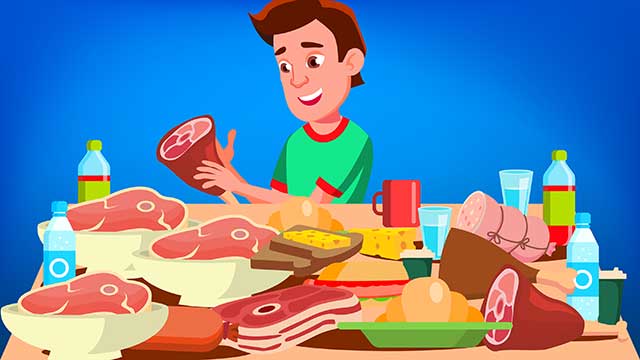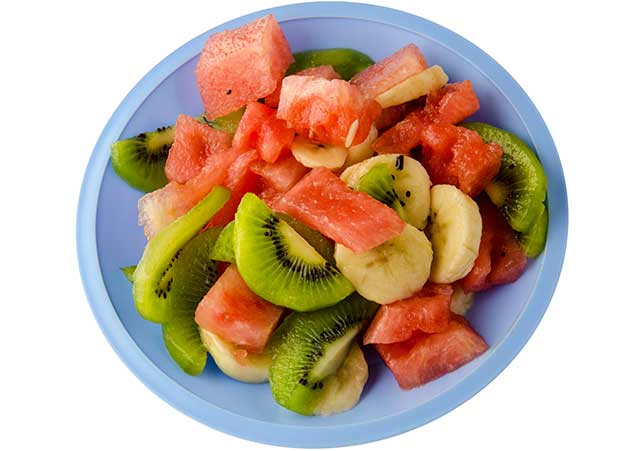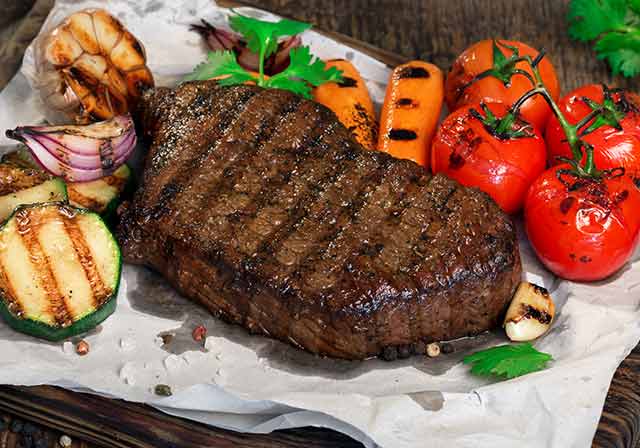Over the past decade, ketogenic diets have gained popularity as a way of eating.
We can find information everywhere about these diets, but, as with anything, not all of it is factual.
For example, there is a common misconception that following a keto diet almost guarantees weight loss.
However, this is very misleading, and it is even possible to gain weight with a ketogenic diet.
This article explains ten potential reasons why someone might not be losing weight on keto.
1) You’re Eating Too Much Fat

It is common to hear claims that we can eat as much fat as we want on a ketogenic diet and still lose weight.
However, this is a myth.
Firstly, consuming any macronutrient in excess will cause problems, and this applies for fat too (1).
While calories are not everything, they do matter. Overfeeding on fat in a calorie surplus will undoubtedly stall weight loss.
Understanding how and why we lose weight is essential. When we lose weight, our body burns its fat stores for energy.
Historically, this stored fat provided us with energy in times of famine or when food was short during long, harsh winters. In other words; our body fat was an energy source in times when we truly needed it (2).
On the other hand, if we consume surplus amounts of fat and calories daily, our body has no need to burn stored fat. Instead, it will use the incoming food for energy.
Yes, the ketogenic diet is a moderate to high-fat plan, and consuming healthy fats can be beneficial.
However, if weight loss is the goal, it is better to focus on whole foods, and avoid adding large amounts of additional fats (such as butter or oil) to our meals.
2) Too Many Calories
Many advocates of low carb and ketogenic diets claim that counting calories isn’t necessary.
This is correct; there is no need to count calories to successfully lose weight (3).
However, just because counting calories isn’t necessary doesn’t mean calories are important.
Often, a diet based on satisfying, nutrient-rich foods will naturally help regulate how much we eat, so people won’t need to focus on counting calories.
That said, if someone is consistently struggling to lose weight on keto, overeating could be the issue.
In this situation, or for anyone who is uncertain about the nutritional content of their meals, tracking calories can be useful tool.
3) Lack of Sleep

Weight loss is not only about what we eat, and it also revolves around our overall lifestyle.
One of the most critical factors is sleep. A lack of sleep can hinder weight loss efforts in several ways:
- Studies show that short sleep duration decreases blood levels of leptin, a satiety hormone that signals the body to stop eating. As a result, food cravings are more likely, even when consuming a sufficient amount of food (4, 5).
- Systematic reviews and randomized trials demonstrate that insufficient sleep increase total food and overall calorie consumption (6, 7).
- Randomized trials consistently show that short sleep decreases insulin sensitivity, increasing the risk of obesity and type 2 diabetes (8, 9, 10).
- Shortened sleep negatively impacts metabolism and daily energy expenditure (11, 12).
As these studies highlight, sufficient sleep is crucial for successful weight loss. Without adequate sleep, our metabolism slows down, we use less energy, we become more insulin resistant, and food cravings intensify. These conditions are the exact opposite of those that support healthy and sustainable weight loss.
Therefore, even a well-implemented ketogenic diet (or any other dietary plan) will likely have limited success in the context of insufficient sleep.
4) Not Doing Enough Exercise
You may have heard the saying, “You can’t outrun a bad diet.”
While it is technically possible to offset a poor diet with exercise for weight management, the same is not true for overall health.
Either way, this expression emphasizes that nutrition is the most critical factor in weight loss, which is true.
However, while diet plays the largest role, exercise can still have a significant impact.
This is particularly true for intense resistance training, as research shows that lifting heavy weights increases resting metabolic rate and energy expenditure (13, 14, 15, 16).
Additionally, exercise helps build muscle, and a higher proportion of lean body mass slightly increases the metabolic rate (17).
Considering all the other benefits that physical activity has for our overall health, there is really no excuse not to include it for those who can.
In short, anyone struggling to lose weight on a ketogenic diet will only benefit from adding physical exercise to their regime.
5) You’re Still Eating Too Many Carbs

The primary goal of ketogenic diets is to shift the body from burning carbohydrates for fuel to burning fat, a state known as ‘ketosis.’
Generally speaking, achieving ketosis require a very low carbohydrate intake.
To achieve this, most individuals undertaking the diet aim for around 50 grams of carbs (or less) per day.
However, it is easy to underestimate the number of carbs (and associated calories) in food.
For instance, it is not just bread, pasta, and rice that are rich in carbohydrates; foods like nuts, root vegetables, and fruit can also contain significant amounts.
For those unsure about the nutritional content of specific foods, it may be useful to track food intake.
There are many tools available for doing this, and Cronometer and ‘My Fitness Pal’ are two (of many) good options.
6) You’re Eating the Wrong (Non-Satiating) Foods
A ketogenic diet itself is neither inherently healthy nor unhealthy, and it depends on the specific foods consumed.
For instance, a diet consisting only of bacon cooked in oil would technically be “ketogenic.” While many people enjoy bacon, this would be far from healthy.
On the other hand, eating the right nutrient-dense foods not only supports health, but it can also aid weight loss.
Some interesting research has examined whether more nutritious foods have a stronger effect on satiety:
- In a randomized trial involving participants with obesity, higher calcium and dairy intake was found to increase circulating levels of peptide YY, a satiety hormone that reduces appetite (18).
- The satiety response to a meal can also be modified by the protein, fiber, and nutrient composition of consumed foods (19).
On a ketogenic diet, it’s important to focus on nutrient-rich, whole foods like fish, meat, nuts, vegetables, and low-sugar fruits.
Over-consuming isolated sources of fat at the expense of these nutritious foods can negatively impact satiety, potentially sabotaging weight loss efforts.
See this ketogenic shopping list for an in-depth list of foods that are suitable for ketogenic diets.
7) You’re Not Eating Enough Protein

While on the topic of satiety, it is important to mention dietary protein since it is the most satiating out of the three macronutrients (20).
Ensuring sufficient protein intake should decrease appetite and lower the likelihood of overeating (21).
Unfortunately, fearing protein is a typical mistake people make on ketogenic diets.
For one thing, research demonstrates that high-protein ketogenic diets can “reduce hunger and lower food intake significantly” (22).
The reason for this fear of protein is a process called gluconeogenesis (GNG).
Gluconeogenesis is a metabolic pathway that converts non-carbohydrate compounds such as amino acids (proteins) into glucose.
Since glucose is essential for the human body, gluconeogenesis is a crucial process that ensures a consistent supply, even in the absence of dietary carbohydrates. However, the issue is that some people fear too much protein will result in excessive glucose production and being “kicked out” of ketosis.
It does not work like this, though, and gluconeogenesis is a constant process – whether eating more protein or not. Furthermore, research shows that dietary protein intake contributes “very little” to the body’s glucose supply (23, 24).
8) There Is An Underlying Medical Issue
This applies to any diet, but if someone attempts a genuinely well-implemented ketogenic diet alongside an overall healthy lifestyle and really should be losing weight but can’t?
It is just a possibility, but an underlying medical issue is one potential (but rare) issue.
For instance, certain medical conditions can make weight loss difficult. These conditions include PCOS, hypothyroidism, and Cushing’s syndrome (25, 26, 27).
For any suspected medical condition, it is important to see a primary care provider at the earliest convenience.
9) You’re Drinking Too Many Calories

Drinking too many calories covers several of the previous topics, namely;
- Not consuming the right foods
- Too many calories
- Too much fat
For example, Bulletproof Coffee (butter in coffee) enjoys popularity with some ketogenic dieters, which can potentially be an issue.
If it is a regular thing, using large amounts of butter or cream in hot drinks is likely displacing nutrient-dense food choices.
Additionally, if adding ad-lib amounts of butter or coconut oil to hot drinks, it is easy to consume an excessive amount of fat/calories without realizing.
Many people who experience weight loss stalls on a keto diet see improvements by cutting down on isolated fats.
10) You’re Suffering From Stress
Stress is another factor that can positively or negatively affect our overall health, and it is capable of stalling weight loss too.
During times of stress, the adrenal glands release a hormone called cortisol (28).
Cortisol is a natural hormone that has some short-term benefits, but chronic stress and excessive cortisol release can cause problems.
Notably, elevated cortisol levels increase appetite and energy intake, and they are predictive of weight gain (29, 30).
Final Thoughts
As shown in this article, ketogenic diets are not magical fat loss tools that automatically work for everyone.
There are right and wrong ways to do the diet, and for anyone considering keto, it is vital to research the diet thoroughly.
A well-formulated ketogenic diet can support healthy and sustainable weight loss, but only if it is the right fit for the individual.
